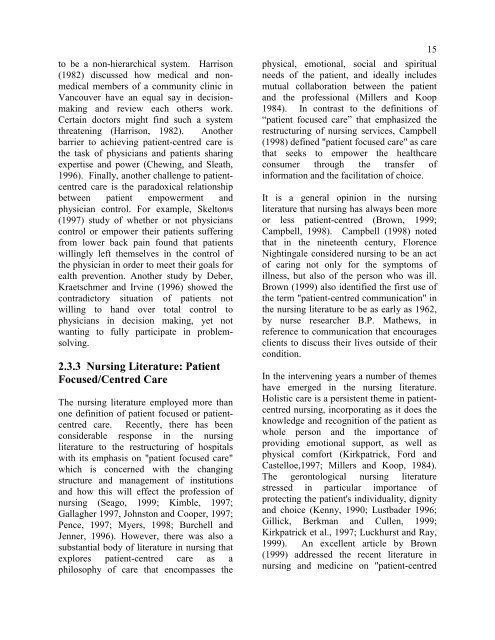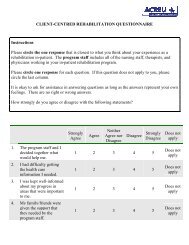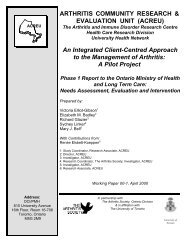Client-Centred Rehabilitation - Arthritis Community Research ...
Client-Centred Rehabilitation - Arthritis Community Research ...
Client-Centred Rehabilitation - Arthritis Community Research ...
Create successful ePaper yourself
Turn your PDF publications into a flip-book with our unique Google optimized e-Paper software.
to be a non-hierarchical system. Harrison<br />
(1982) discussed how medical and nonmedical<br />
members of a community clinic in<br />
Vancouver have an equal say in decisionmaking<br />
and review each other=s work.<br />
Certain doctors might find such a system<br />
threatening (Harrison, 1982). Another<br />
barrier to achieving patient-centred care is<br />
the task of physicians and patients sharing<br />
expertise and power (Chewing, and Sleath,<br />
1996). Finally, another challenge to patientcentred<br />
care is the paradoxical relationship<br />
between patient empowerment and<br />
physician control. For example, Skelton=s<br />
(1997) study of whether or not physicians<br />
control or empower their patients suffering<br />
from lower back pain found that patients<br />
willingly left themselves in the control of<br />
the physician in order to meet their goals for<br />
ealth prevention. Another study by Deber,<br />
Kraetschmer and Irvine (1996) showed the<br />
contradictory situation of patients not<br />
willing to hand over total control to<br />
physicians in decision making, yet not<br />
wanting to fully participate in problemsolving.<br />
2.3.3 Nursing Literature: Patient<br />
Focused/<strong>Centred</strong> Care<br />
The nursing literature employed more than<br />
one definition of patient focused or patientcentred<br />
care. Recently, there has been<br />
considerable response in the nursing<br />
literature to the restructuring of hospitals<br />
with its emphasis on "patient focused care"<br />
which is concerned with the changing<br />
structure and management of institutions<br />
and how this will effect the profession of<br />
nursing (Seago, 1999; Kimble, 1997;<br />
Gallagher 1997, Johnston and Cooper, 1997;<br />
Pence, 1997; Myers, 1998; Burchell and<br />
Jenner, 1996). However, there was also a<br />
substantial body of literature in nursing that<br />
explores patient-centred care as a<br />
philosophy of care that encompasses the<br />
15<br />
physical, emotional, social and spiritual<br />
needs of the patient, and ideally includes<br />
mutual collaboration between the patient<br />
and the professional (Millers and Koop<br />
1984). In contrast to the definitions of<br />
“patient focused care” that emphasized the<br />
restructuring of nursing services, Campbell<br />
(1998) defined "patient focused care" as care<br />
that seeks to empower the healthcare<br />
consumer through the transfer of<br />
information and the facilitation of choice.<br />
It is a general opinion in the nursing<br />
literature that nursing has always been more<br />
or less patient-centred (Brown, 1999;<br />
Campbell, 1998). Campbell (1998) noted<br />
that in the nineteenth century, Florence<br />
Nightingale considered nursing to be an act<br />
of caring not only for the symptoms of<br />
illness, but also of the person who was ill.<br />
Brown (1999) also identified the first use of<br />
the term "patient-centred communication" in<br />
the nursing literature to be as early as 1962,<br />
by nurse researcher B.P. Mathews, in<br />
reference to communication that encourages<br />
clients to discuss their lives outside of their<br />
condition.<br />
In the intervening years a number of themes<br />
have emerged in the nursing literature.<br />
Holistic care is a persistent theme in patientcentred<br />
nursing, incorporating as it does the<br />
knowledge and recognition of the patient as<br />
whole person and the importance of<br />
providing emotional support, as well as<br />
physical comfort (Kirkpatrick, Ford and<br />
Castelloe,1997; Millers and Koop, 1984).<br />
The gerontological nursing literature<br />
stressed in particular importance of<br />
protecting the patient's individuality, dignity<br />
and choice (Kenny, 1990; Lustbader 1996;<br />
Gillick, Berkman and Cullen, 1999;<br />
Kirkpatrick et al., 1997; Luckhurst and Ray,<br />
1999). An excellent article by Brown<br />
(1999) addressed the recent literature in<br />
nursing and medicine on "patient-centred








